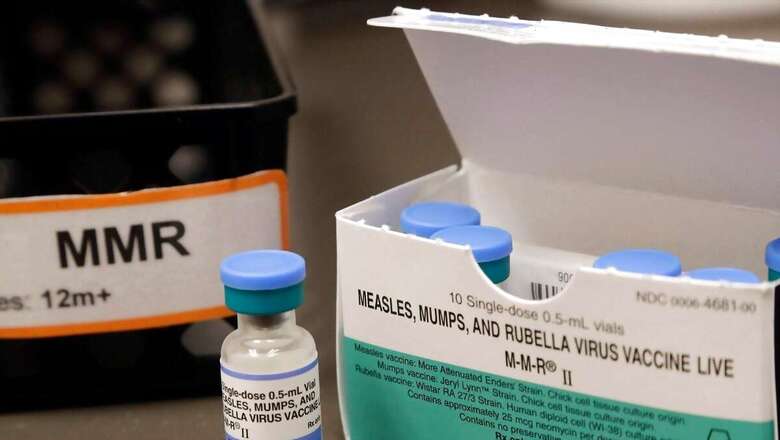
views
A number of states have reported high incidences of mumps in the last one month, with Delhi-NCR also reporting the occurrence of the viral infection now.
Though the sporadic occurrence of cases with clustering is a well-established phenomenon in mumps, there has been a widespread resurgence in infections being reported from several states, including Kerala, Maharashtra, Telangana and Andhra Pradesh, in the last few months. According to government data, this year, the case tally has reached 15,637, as of March 2024.
Mumps is an acute viral infection that usually affects children and young adults causing acute flu-like symptoms with after effects. Its symptoms include fatigue, muscle pain, loss of appetite, headache, fever and pain while chewing. Also, salivary gland inflammation and testicle inflammation lead to prolonged sequelae and discomfort.
The disease runs for five to seven days and usually resolves without major complications. It is spread through droplets and is preventable by a vaccine, administered between the age of nine months and 4.5 years.
But, despite being preventable by vaccine, mumps has not been included in the nation’s universal immunisation programme (UIP) due to its low mortality rate. From a public health standpoint, priority has been given to the elimination of measles as it is more infectious and severe.
Doctors across Delhi-NCR notice surge
“Over the past few days, Delhi has seen a notable rise in cases with approximately three to four cases per week reported in our OPD (out-patient department), and almost two admissions per week,” Dr RD Srivastava, head of the department of paediatric medicine and neonatology at the New Delhi-based Sri Balaji Action Medical Institute, told News18.
“While Delhi hasn’t escalated to hotspot status like other states, including Maharashtra, Andhra Pradesh, Telangana, Tamil Nadu and Rajasthan, the prevalence of mumps is alarming,” said Dr Srivastava said.
Other doctors echoed similar observations.
“We have also witnessed an increase in cases with 10 to 12 in the ongoing month itself,” said Dr Neha Rastogi Panda, consultant for infectious diseases, Fortis Memorial Research Institute in Gurugram.
“To begin with seasonal trends, this rise has led to major community outbreaks. Such a steep surge in cases has potential implications to lead to an increase in sequelae and complications such as orchitis, meningoencephalitis and increased morbidity,” said Dr Panda.
While Srivastava said among the reported cases, around one-third of the cases affect children, albeit with mostly mild symptoms, Dr Panda from Fortis found it mainly occurring in young adults from the age of 18 to 25 years.
Dr Preeti Anand from paediatrics at Max Smart Super Speciality Hospital in Saket has also noticed a sudden surge. “There has been a sudden rise in the number of cases of mumps in the last few months. Patients typically come with fever, malaise and painful swelling on the cheek or angle of the mouth, which is a swelling of the parotid gland parotitis,” the doctor said.
Why are cases on the rise?
Experts said the resurgence can be attributable to multiple factors such as reduced or limited coverage of mumps in universal immunisation schedules in large populations of children.
Further, waning immunity is a well-established fact in mumps. With growing age, immunity may decrease, leaving individuals susceptible to the virus. Social and environmental factors also play a role.
“Increased contact among children in schools allows the virus to spread alongside poor hygiene practices and inadequate sanitation to further facilitate transmission,” said Dr Panda from Fortis.
Mumps is a preventable infection and routine immunisation is crucial for maintaining both individual as well as herd immunity. If a significant number of children are vaccinated, community spread of the virus can be curtailed.
Proper hygiene and sanitation with personal protective behaviour – hand hygiene and masks with distancing – are quintessential measures in its preventive strategy. Once symptomatic, appropriate isolation measures should be adopted.
Experts said these people should be advised to minimise public exposure, timely vaccination and seek immediate advice from medical experts once symptomatic.
Elder individuals, people with compromised immunity and pregnant women are at higher risk of acquiring mumps. “Children, elders and immunocompromised individuals need to be extra cautious. Reasons for the disease include compromised health statuses, escalating pollution levels, shifting climate patterns, and vaccine hesitancy. We need to educate people to adhere to preventive measures,” Dr Srivastava said.
Stay Ahead With all the Lok Sabha Election 2024 Related Real-Time Updates At News18 Website.


















Comments
0 comment